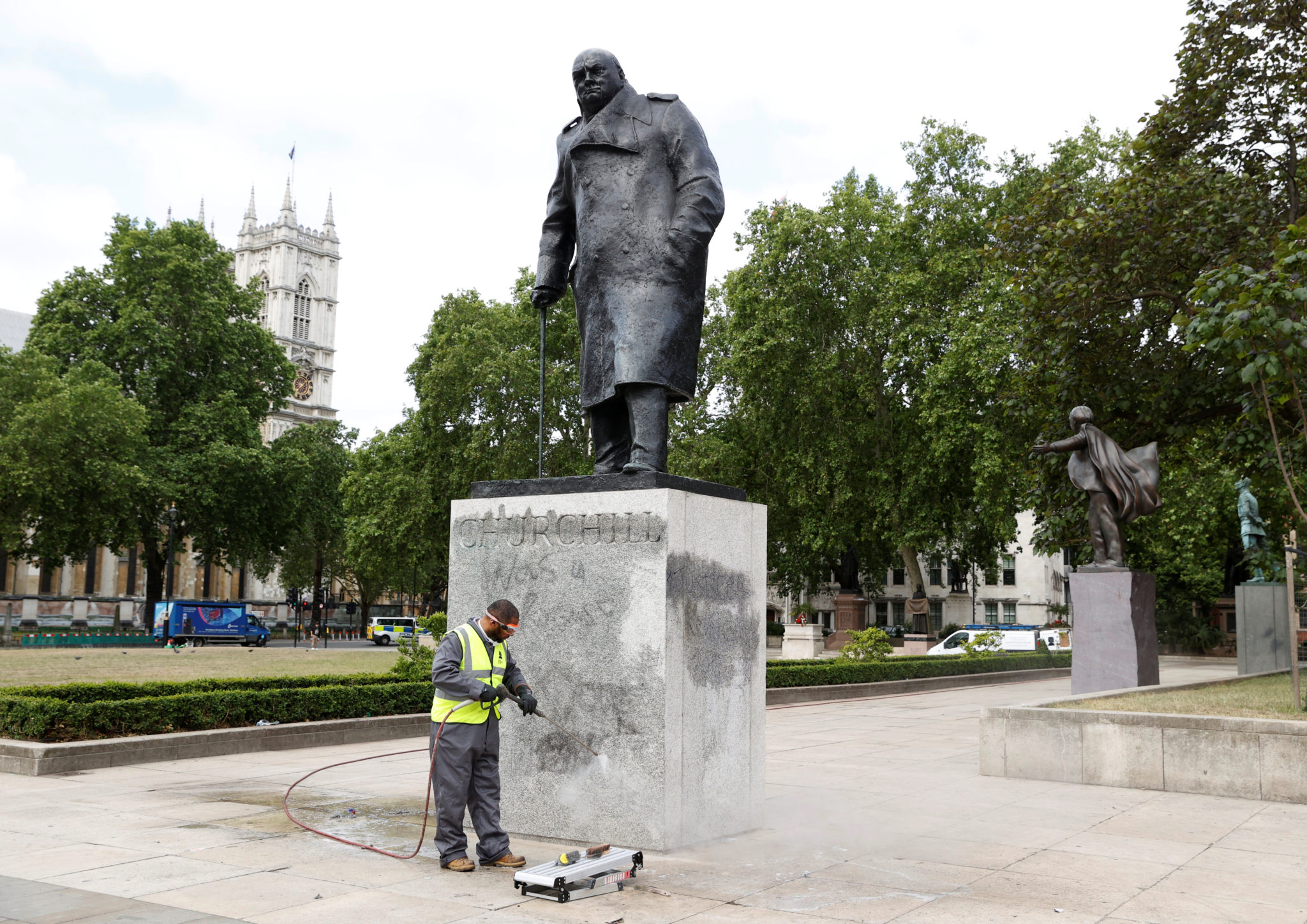
Graffiti fjernes fra sokkelen til Winston Churchill-statuen på Parliament Square i London den 8. juni etter å ha blitt tilgriset under Black Lives Matter-protester. Foto: John Sibley / Reuters / NTB scanpix.
En meningsmåling utført på oppdrag fra den britiske tenketanken Policy Exchange viser at 80 prosent av de spurte i Storbritannia mener at statuen av Winston Churchill må bli stående på Parliament Square i London, til tross for krav fra en Black Lives Matter-leder om at den må tas ned.
Kun 10 prosent av de spurte i undersøkelsen, som er omtalt i The Telegraph og The Times, mener at Churchill-statuen bør tas ned.
Målingen viser at et stort flertall er stolt av britisk historie, og at det ikke er rett å dømme historiske skikkelser ut fra dagens standarder:
1. 69% are proud of UK history as a whole, with only 17% saying it is something to be ashamed of
2. 65% say “it is unfair to make judgments about people in the past based on today’s values” and agree that “statues of people who were once celebrated should be allowed to stand”
Mer enn tre fjerdedeler synes det er bedre å lære av historien enn å omskrive den:
3. 77% say “We should learn from history rather than try to re-write it”
4. Only 20% agree that “we should question how we look at British history and no longer recognise success if it caused misery or suffering to some victims”
5. 80% say Churchill’s statue should stay in Parliament Square, after a Black Lives Matter leader said it should be removed, with clear support for Churchill staying put across all age groups
6. Serious concerns about role of police in protecting statues, with 75% saying they need to protect statues from violent removal
Meningsmålingen er utført i forbindelse med Policy Exchanges prosjekt History Matters. Nå er historien blitt gjenstand for en kulturkrig, fastslår tenketanken. Ytterliggående ideer er i ferd med å få innflytelse på den politiske hovedstrømmen:
Yet in recent weeks history has become the focus of a new culture war that, having started on the political fringes, now seems to be having a direct effect on mainstream institutions, many of which are rushing to distance themselves from controversial aspects of their past.
Eksemplene på moralske rengjøringsprosjekter florerer:
The Bank of England has “commenced a thorough review of its collection of images of former Governors and Directors to ensure none with any such involvement in the slave trade remain on display anywhere in the Bank”. The Rugby Football Union is reviewing the singing of “Swing Low, Sweet Chariot” by fans, as it is thought to have been written in the mid-19th century by Wallace Willis, a black slave. The Tate galleries, named after the industrialist Henry Tate, who made his fortune as a sugar refiner, reportedly may be renamed, despite the fact that Tate was not himself a slave-owner or slave-trader. Elsewhere, universities are actively considering the “decolonising” of curriculums; authorities are debating the removal of statues of historical figures from public squares; and other institutions – including the National Trust – are considering how to address their links to past wrongs. Across the board, the speed and scale of what is happening is striking – as institutions seek to insulate themselves from the charge of ‘being on the wrong side of history’.
Yet whose history is it?
Hva folk flest mener om saken, er stort sett fraværende i offentligheten, konkluderer Policy Exchange. History Matters’ prosjektleder Trevor Phillips mener at det som pågår nå, skjer ubetenksomt og uten debatt, og maner til å stanse opp og reflektere:
But what concerns me about the current moment is the rapid and unthinking way in which large swathes of our public heritage is being effectively re-written, or erased entirely – much of it seemingly without much proper debate or forethought. It all adds up to a major transformation in the way in which we deal with history in the public square. At a minimum, we think there needs to be pause for reflection – and to consider what is being done, why and with what effect.






